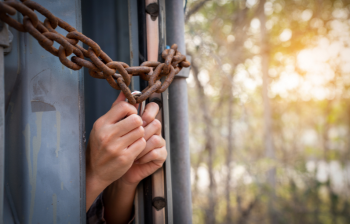by Steve Galster, Freeland
Some argue that “human trafficking” and “human slavery” are two different things. Academics aside, if you consider that in both cases the person loses their freedom, is subject to abuse and does not get paid, they are close enough to being the same thing. Both result in victims.
The UN definition for human trafficking includes one or more of the following elements: deceit, coercion and/or force.
 The fact that human trafficking continues today, and is in fact more profitable than ever, is astounding to most people. Some estimates of gross sales from this business go as high as $150 billion a year. How can it be that there are more slaves today than ever before? Forty million, some experts reckon.
The fact that human trafficking continues today, and is in fact more profitable than ever, is astounding to most people. Some estimates of gross sales from this business go as high as $150 billion a year. How can it be that there are more slaves today than ever before? Forty million, some experts reckon.
One could write a book to answer that question, and some books try do just that, but in a nutshell, one major factor is that modern-day slavery often begins with a vulnerable victim.
In comparison to the old kind of slavery, where people were sold to middlemen and put on a ship for consumer countries, today’s human trafficking often starts out as human smuggling. A person wanting to have a better life is lured into a recruitment trap that promises them that their dreams will come true. The list of fraudulent schemes is endless: Marketing jobs at companies that turn out to be online scam centers where recruits are locked up and even beaten when they try to run away. Construction jobs where recruits work 50% overtime, make less than half of what they were promised, and sometimes only enough to eat. Even that is better than fishing vessels, where men get stuck at sea for up to two years, earning nothing at all, and are known to be thrown overboard for protesting.
The victim may know that what they are signing up for violates some law along the way: immigration, labor or other laws. But the recruit-cum-victim is so desperate and willing to believe that the job being promised will help them, that they are willing to sign up.
And this almost always involves agreeing to pay back the person or company that is helping to place them in their new job. Because such opportunities cost money, and the recruit does not have that kind of money. Otherwise, they would not be signing up for such opportunities. How much are we talking? It varies. Uzbek women were being charged $7,000/person for jobs in Southeast Asia, while Bangladeshi men were being charged a similar amount for security and construction jobs in Pacific islands, with some offering to sell their kidneys as collateral.
What is being done about this madness? Not enough. What can be done? Buying your products and services from companies that do their due diligence, making sure that their supply chains are clean of human trafficking. More companies are advertising their anti-human trafficking policies. You may pay a bit more, but a good conscience is worth it. And if you think you see signs of human trafficking, notify the appropriate authorities. One civil society organization that takes tips and finds help for victims is Freeland: www.freeland.org or
How many slaves work for you? Take the survey and watch the 10 years of progress made since Slavery Footprint launched.
Sources:
Human-Trafficking | United Nations Office on Drugs and Crime
How much money is made by human trafficking and modern slavery? | Hope for Justice
50 million people worldwide in modern slavery | International Labour Organization
Escaping the clutches of sex trafficking in Thailand | Al Jazeera
Interviews by the author with victims and caregivers
About the author:
Steven R. Galster is the Founder of the counter-trafficking NGO Freeland. He is an expert on transnational organized crime, trafficking and illicit markets, having investigated arms, wildlife and human trafficking across the world since 1985. Projects he designed disrupted illicit trades in people and wildlife, enabling the recovery of endangered species and vulnerable communities in Russia, Africa and Asia. He and his teams helped authorities bring down major criminals and corrupt officers on four different continents, together with freezing and seizing over $50 million in illegal assets. Galster and his reports have featured on CNN, BBC, TIME, National Geographic, Discovery, Al Jazeera, and in The New York Times. He is the co-creator of seven organizations: WildAid, Wildlife Alliance, Phoenix, ASEAN-WEN, Freeland, ACET and EarthTeam. Galster graduated from George Washington University with an MA in Security Policy Studies and Grinnell College with a BA in Political Science.

